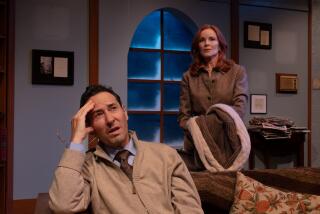STAGE REVIEW : Agony on Trial
NEW YORK — “People die from an excess of the truth,” goes a line somewhere in the second half of Ariel Dorfman’s “Death and the Maiden,” that opened Tuesday at the Brooks Atkinson Theatre. It sums up in a nutshell, what this self-exiled Chilean’s latest play is mostly about: the truth. Does it exist? Whose truth? And can it ever be finite?
New take. Old subject. Somewhere “in a country that is probably Chile, but could be any country that has given itself a democratic government just after a long period of dictatorship,” a husband brings home a stranger whom his wife recognizes, or thinks she recognizes, as a doctor who tortured and raped her years ago.
The husband, Gerardo Escobar, is a self-possessed lawyer with burgeoning political connections in the new democracy, played here with real Yankee self-possession by Richard Dreyfuss. The stranger Escobar brings home is Roberto Miranda, a man who picked him up on the highway when he had a flat tire and discovered that his spare was flat and his jack was missing. The good Samaritan’s reward when he accompanies his rider into the house are the perceptions, or misperceptions, of the man’s skittish wife, Paulina Salas.
Paulina is an unstable woman with her own political and psychiatric history. Thinking she recognizes Miranda (a straightforward Gene Hackman) as the torturer who, under the previous dictatorship, abused and tormented her, she bides her time and, in the night, single-handedly knocks the man out and trusses him to a chair. Guess who’s surprised to find him there in the morning.
The rest of the play revolves around the issue of what’s real and what’s not, who is remembering correctly and who isn’t and what to do to resolve it. The situation is made in heaven. Or in hell. A woman who has been tortured now finds herself in possession of her torturer, tipped off by his affection for the music of Franz Schubert which, she claims, he listened to during their sessions together. (Hence the play’s title, taken from Schubert’s quartet.)
So the victim becomes the aggressor and somewhere in the middle, the truth is irretrievably lost. So much so, that Dorfman, too, is not able to provide a satisfactory ending. Instead, he provides a confusing one. Along the way he flirts with threats of violence and tosses in some theatrical gimmickry, such as having Paulina remove her panties to make a gag for her prisoner. And he ups the ante by digging up old grievances between husband and wife with which to poison the air.
“Rashomon” is the classic example of the unresolvable triangle in which three people each have their own version of the truth, a subject of endless permutations. But set-ups such as this one amount to loaded decks. Despite individual scenes of carefully calculated power, with Glenn Close as a hard-edged, erratic Paulina who stalks Hackman as her enemy with the zeal of a starving tigress, the danger in “Death and the Maiden” is too contrived to be seriously dangerous.
That’s one problem. Another has to do with the play’s identity. It wants to be political, with glancing references to the previous regime and the difficulty of adapting to democracy (“We survived dictatorship and now we’re doing to each other what those bastards did to us”), but its politics aren’t convincing. As in Dorfman’s “Widows,” seen last year at the Mark Taper Forum, they are an overlay on what amounts to a whodunit. Since the play has been directed by Mike Nichols as exactly that, a straightforward whodunit with marital complications, the results are perfunctory, and while the actors are certainly skilled, they are rarely deep.
Close captures something primitive and instinctual when, as the obsessed victim-predator, she recognizes her nemesis by his smell and skin as well as his taste in music. But except for these isolated events, an emotional sensibility has been missed here and a pseudo-suspense substituted for it. Even Dorfman’s attempt at a more profound examination of the nature of truth and deception, with false confessions that may be true and marital dissembling (“He deceived me for my own good and I deceived him for his own good”), is scuttled by the literal approach.
The action, except for a brief last scene, takes place on the open terrace-living room of a swanky seaside home, enticingly designed by Tony Walton and lit by Jules Fisher, that has a distancing aura of affluence and elitism without the style to go with it. Tom Sorce’s sound of crashing waves is a constant underlying throb. But it is also symptomatic of the kind of cosmetics on which the production relies instead of counting on its own inward propulsion.
This detachment is not healthy for a play that concerns itself with any number of passionate emotions, and it’s hard to tell if it is Nichols’ idea or Dorfman’s. “Death and the Maiden’s” success in London suggests the former. Either way, this production begs for more glory than it can muster.
‘Death and the Maiden’
Glenn Close: Paulina Salas
Richard Dreyfuss: Gerardo Escobar, her husband
Gene Hackman: Roberto Miranda
A play by Ariel Dorfman at the Brooks Atkinson Theatre. Producers Roger Berlind, Gladys Nederlander, Frederick Zollo, in association with Thom Mount and Bonnie Timmermann. Associate producers Hal Luftig, Ron Kastner, Peter Lawrence, Sue Macnair. Director Mike Nichols. Sets Tony Walton. Lights Jules Fisher. Costumes Ann Roth. Sound Tom Sorce. Production stage manager Anne Keefe.
More to Read
The biggest entertainment stories
Get our big stories about Hollywood, film, television, music, arts, culture and more right in your inbox as soon as they publish.
You may occasionally receive promotional content from the Los Angeles Times.










